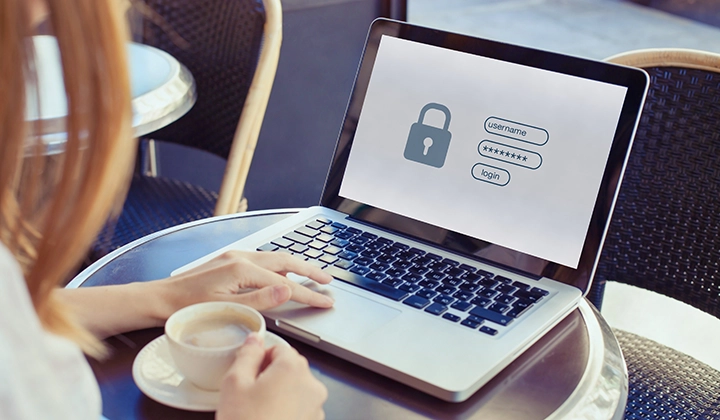Our Mission:
Protect Your Accounts and Identity
Fake emails. Unsolicited phone calls. Changes of address.
Identity thieves both online and offline may use any number of techniques to gain access to your accounts or to obtain your personal information in order to open new accounts in your name. It’s important for you to be able to recognize identity theft and online fraud and to follow some simple steps to ensure you don’t unwittingly become a victim.
Fraudulent e-mails masquerading as legitimate requests for information from sources you trust, often referred to as “phishing” or “spoofing” are commonly used by cyber-thieves to trick you into providing confidential information like account numbers, online IDs, usernames, and passwords. These e-mails aren’t always easy to identify. They can be very sophisticated, using the graphics, logos, and the “look and feel” of legitimate organizations with which you do business. They often ask you to reply directly or take you to an equally sophisticated website where you’re requested to provide or verify personal information.

Scams In Our Area
Microsoft Popup Scam - this is where you get a popup on your computer that will say Microsoft sees there is a problems with your PC/Laptop. They will say that support can fix the issue if they can get on your PC/Laptop. They will have you either call or click on link to give them access to your device. They will then try to steal information from your PC and even try to get you to give out your banking information or credentials to your Online Banking so they can try to steal money from you.
Burial Trust Scam - this is where a bad actor will contact you asking you questions about your Burial Trust to get personal information about you and even request you to give information on Online Banking.
How to Spot a Fraudulent Email
The imposter “phishing” or “spoofing” attempts often share some common tell-tale signs of their deceptive intent:
Urgent Requests
A fraudulent e-mail may claim your account is in danger of closure if you fail to update or authenticate personal information immediately.
Requests For Lost Information
Claims that your bank or other business has lost important security information associated with your account may be accompanied by a request to visit a website to complete an updated form.
Unrecognized E-mail and Web Addresses
The reply-to e-mail address or the website address within fraudulent e-mails will often be unrecognized as coming from your bank or other business.
Typos and Language Errors
Many of these attempts originate outside the United States and may contain obvious typos, awkward language and sentence structure, or appear unprofessional or of poor quality.
Take Steps to Protect Yourself
Don’t provide personal information like account numbers, online IDs, usernames, or passwords to anyone via e-mail, on the phone, or on a website unless you initiated the contact and are absolutely certain with whom you are communicating.
Be suspicious of every e-mail, website, or phone call requesting you to update, authenticate, or verify ANY personal information. Always be aware of the ease with which phony e-mails and websites can be created.
Confirm requests with the source directly if you are asked to update or verify information. Call your bank or other business directly if you receive a phone request. Open a new web browser window and go to the website directly if you receive a request for information via e-mail and look to see if this information is being requested anywhere on the site.
Keep your web browser and other software up to date. Keeping your software, web browser, and e-mail application up to date will help ensure that you’re receiving the benefit of the latest security features. Using anti-virus software will help ensure that a virus or malicious software code isn’t compromising the security of your computer.
Make online purchases selectively from legitimate online vendors who provide secure order forms and actively protect your personal information. ALWAYS sign-off websites or secure web pages for which you are required to use an ID or username and password.
Choose passwords wisely by using both letters and numbers together with a combination of lowercase and capital letters. DON’T use names, birth dates, or other easy-to-guess information. DO use different password combinations for each account and change them often.
Keep a list of bank and credit accounts, including account numbers, billing addresses and phone numbers, in a safe deposit box. Include credit limit amounts, expiration dates and other pertinent information. Report lost or stolen credit cards or checks to the card issuer or bank.
Review your bank and credit card statements carefully to assure yourself that no suspicious items are appearing. Investigate suspicious items immediately and notify your bank right away if you see anything unusual.
Dispose of financial information carefully, including credit solicitations and other personal information by shredding or tearing before depositing it in the trash.
Periodically review your credit report to check for new accounts, which you did not open, or to find unusual activity or erroneous listings or reporting from existing accounts.
What Should I Do If My Identity Has Been Stolen?
In the event that you suspect your identity has been stolen or you are, in fact, certain that it has been stolen, follow these simple steps:
Contact at least one of the three national credit bureaus. Ask that a fraud alert be placed in your file and request a free credit report.
Close all accounts that are or may be affected by the identity theft.
Contact NSB at any of the six full-service branches:
- Mason City West branch: (641) 423-7638
- Mason City East branch: (641) 423-1432
- Northwood branch: (641) 324-1023
- Forest City branch: (641) 585-3247
- Thompson branch: (641) 584-2275
- Titonka branch: (515) 928-2142